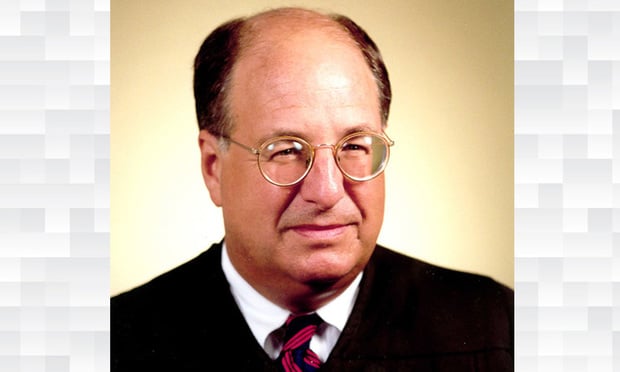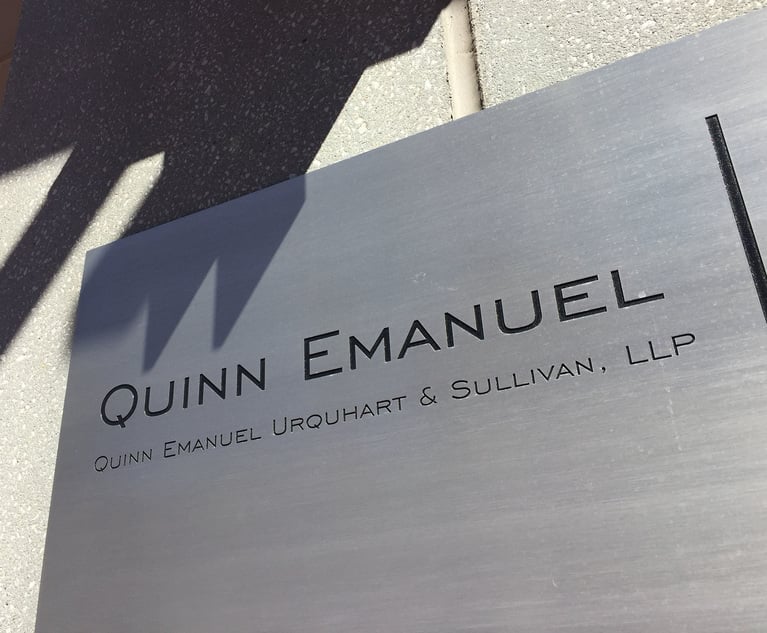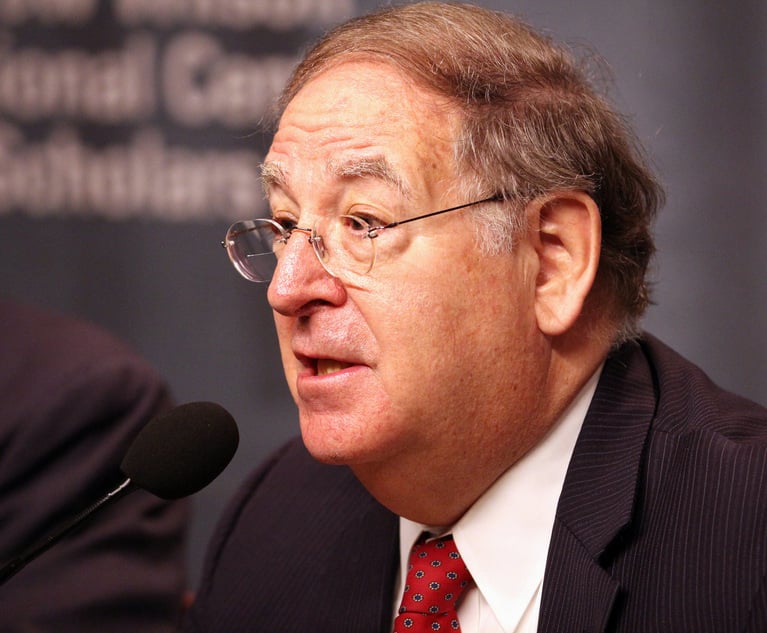Judge in Case Over State Street Overbilling Is Considering Appointing New Class Counsel
U.S. District Judge Mark Wolf in Boston said he would address concerns by three plaintiffs firms currently serving as class counsel to State Street customers about the deadline to propose redactions to the report, which the special master filed under seal on May 14.
May 29, 2018 at 05:32 PM
6 minute read
 Senior Judge Mark Wolf of the U.S. District Court for the District of Massachusetts/courtesy photo
Senior Judge Mark Wolf of the U.S. District Court for the District of Massachusetts/courtesy photo
A federal judge has set a hearing for Wednesday to decide whether to appoint new class counsel in a securities class action against State Street following a special master's report into potential overbilling in a $75 million attorney fee request.
In an order on Friday, U.S. District Judge Mark Wolf in Boston said he would address concerns by three plaintiffs firms currently serving as class counsel to State Street customers—San Francisco's Lieff Cabraser Heimann & Bernstein, New York's Labaton Sucharow and the Thornton Law Firm in Boston—about the deadline to propose redactions to the report, which the special master, retired U.S. District Chief Judge Gerald Rosen of the Eastern District of Michigan, filed under seal on May 14. Wolf also said he would address the scope of materials that Rosen wants to make public.
But Wolf also ordered that the executive director of the Arkansas Teacher Retirement System, the lead plaintiff in the case, and “anyone else required to act” for the pension fund, show up at the hearing, which would address whether new class counsel should be appointed in light of a potential conflict of interest.
The special master's report and recommendations, he wrote, “raise questions concerning: whether ATRS properly discharged its duties as lead plaintiff” and “whether ATRS should be replaced as lead plaintiff; whether there is now a conflict between the interests of customer class counsel and the class; and whether new class counsel should be appointed to provide independent advice to the class whether or not ATRS continues as lead plaintiff.”
Lawyers for the three firms serving as class counsel did not respond to requests for comment. Lieff Cabraser's Richard Heimann is representing the firm. Labaton's counsel is Joan Lukey, practice group leader of the complex trial and appellate litigation at Choate Hall & Stewart in Boston. And the Thornton Law Firm's attorney is Brian Kelly of Nixon Peabody.
Barrett & Singal's William Sinnott and Elizabeth McEvoy, Boston attorneys who represent Rosen, declined to comment. State Street's attorneys at Wilmer Cutler Pickering Hale and Dorr, did not respond to a request for comment.
Wolf appointed Rosen a year ago to look into potential overbilling in a $300 million settlement of securities class actions alleging State Street overcharged pension fund clients in connection with foreign currency trades.
The three firms admitted to double counting hours relating to staff attorneys but continued to defend their fee request. They also agreed to pay up to $2 million for the special master's investigation.
Rosen has delayed his report several times and asked for more money.
In February, he sought a delay to give plaintiffs lawyers more time to respond to an 85-page expert report that New York University School of Law professor Stephen Gillers prepared for him as part of the investigation. He noted at that time that his final report could have “serious and far-reaching adverse ramifications” for plaintiffs firms in the case and “for the practice of the plaintiffs' class action bar.”
Last month, Rosen wrote that “our work has been made considerably more extensive and costly” after the plaintiffs firms had retained eight experts who provided “a more complete and informed view of the case.”
His investigation resulted in about 10,000 pages, including dozens of depositions, according to court filings. Wolf had ordered plaintiffs firms to file motions for redactions to the report by May 31.
On May 24, the three plaintiffs firms sought an extension to June 11 to submit those redactions and raised concerns about the timing of the redacted report's release to the public. They also insisted that only lawyers from Wilmer, and not their client, State Street, review the unredacted documents.
In two separate motions, they asked to limit the materials that the special master intends to file as part of his redacted report. Rosen said he was bound by court order to file “a record of all evidence,” but the plaintiffs firms said such a move “threatens to drag the parties and the court into an extraordinarily expensive and unnecessary redaction process” and inundate the court with “a truck-load of bankers' boxes,” according to court documents.
“Customer class counsel have already paid $3.8 million to fund the special master's work, in addition to incurring significant legal fees and spending substantial time responding to the investigation,” they wrote in a memorandum submitted on Friday. “Filing the entire discovery record, and the attendant redaction process, would be costly for the firms and would unnecessarily drain judicial resources.”
In his Friday order, Wolf granted an extension until June 5, with a “possible further extension” to June 11.
Ted Frank, of the Center for Class Action Fairness at the Competitive Enterprise Institute, flagged the State Street special master's report in the $115 million data breach settlement with Anthem. In that case, another special master released a report on April 24 recommending cutting nearly $9 million from a $38 million fee request by four law firms, including Lieff Cabraser, due to contract attorney rates and duplicative billing.
Frank, who filed an amicus brief in the State Street case last year, said “it's hard to imagine that there isn't at least the perception of a material issue affecting Rule 23(a) or Rule 23(g),” referring to the provisions of Rule 23 of the Federal Rules of Civil Procedure that govern the filing of class actions and appointment of class counsel. “And the special master's earlier reports to the court requesting extensions and requesting giving class counsel more time to brief the case lead me to believe that we were going to see something explosive.”
This content has been archived. It is available through our partners, LexisNexis® and Bloomberg Law.
To view this content, please continue to their sites.
Not a Lexis Subscriber?
Subscribe Now
Not a Bloomberg Law Subscriber?
Subscribe Now
NOT FOR REPRINT
© 2025 ALM Global, LLC, All Rights Reserved. Request academic re-use from www.copyright.com. All other uses, submit a request to [email protected]. For more information visit Asset & Logo Licensing.
You Might Like
View All
Trump Administration Faces Legal Challenge Over EO Impacting Federal Workers
3 minute read
Private Equity Giant KKR Refiles SDNY Countersuit in DOJ Premerger Filing Row
3 minute read
Quinn Emanuel Files Countersuit Against DOJ in Row Over Premerger Reporting
3 minute read
'Thoughtful Jurist': Maryland US District Senior Judge Messitte Dies After Short Illness
4 minute readTrending Stories
Who Got The Work
J. Brugh Lower of Gibbons has entered an appearance for industrial equipment supplier Devco Corporation in a pending trademark infringement lawsuit. The suit, accusing the defendant of selling knock-off Graco products, was filed Dec. 18 in New Jersey District Court by Rivkin Radler on behalf of Graco Inc. and Graco Minnesota. The case, assigned to U.S. District Judge Zahid N. Quraishi, is 3:24-cv-11294, Graco Inc. et al v. Devco Corporation.
Who Got The Work
Rebecca Maller-Stein and Kent A. Yalowitz of Arnold & Porter Kaye Scholer have entered their appearances for Hanaco Venture Capital and its executives, Lior Prosor and David Frankel, in a pending securities lawsuit. The action, filed on Dec. 24 in New York Southern District Court by Zell, Aron & Co. on behalf of Goldeneye Advisors, accuses the defendants of negligently and fraudulently managing the plaintiff's $1 million investment. The case, assigned to U.S. District Judge Vernon S. Broderick, is 1:24-cv-09918, Goldeneye Advisors, LLC v. Hanaco Venture Capital, Ltd. et al.
Who Got The Work
Attorneys from A&O Shearman has stepped in as defense counsel for Toronto-Dominion Bank and other defendants in a pending securities class action. The suit, filed Dec. 11 in New York Southern District Court by Bleichmar Fonti & Auld, accuses the defendants of concealing the bank's 'pervasive' deficiencies in regards to its compliance with the Bank Secrecy Act and the quality of its anti-money laundering controls. The case, assigned to U.S. District Judge Arun Subramanian, is 1:24-cv-09445, Gonzalez v. The Toronto-Dominion Bank et al.
Who Got The Work
Crown Castle International, a Pennsylvania company providing shared communications infrastructure, has turned to Luke D. Wolf of Gordon Rees Scully Mansukhani to fend off a pending breach-of-contract lawsuit. The court action, filed Nov. 25 in Michigan Eastern District Court by Hooper Hathaway PC on behalf of The Town Residences LLC, accuses Crown Castle of failing to transfer approximately $30,000 in utility payments from T-Mobile in breach of a roof-top lease and assignment agreement. The case, assigned to U.S. District Judge Susan K. Declercq, is 2:24-cv-13131, The Town Residences LLC v. T-Mobile US, Inc. et al.
Who Got The Work
Wilfred P. Coronato and Daniel M. Schwartz of McCarter & English have stepped in as defense counsel to Electrolux Home Products Inc. in a pending product liability lawsuit. The court action, filed Nov. 26 in New York Eastern District Court by Poulos Lopiccolo PC and Nagel Rice LLP on behalf of David Stern, alleges that the defendant's refrigerators’ drawers and shelving repeatedly break and fall apart within months after purchase. The case, assigned to U.S. District Judge Joan M. Azrack, is 2:24-cv-08204, Stern v. Electrolux Home Products, Inc.
Featured Firms
Law Offices of Gary Martin Hays & Associates, P.C.
(470) 294-1674
Law Offices of Mark E. Salomone
(857) 444-6468
Smith & Hassler
(713) 739-1250










